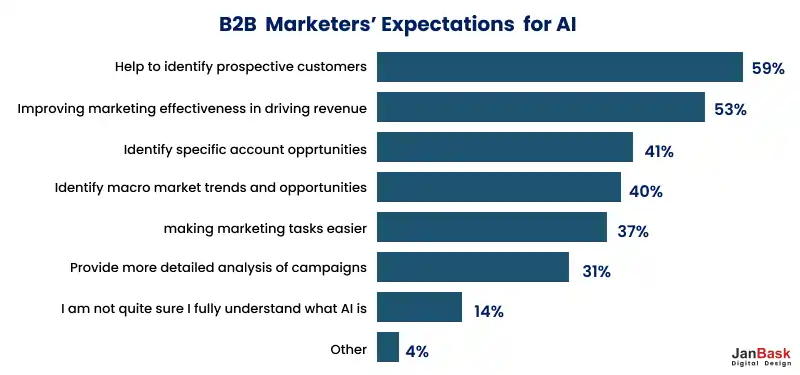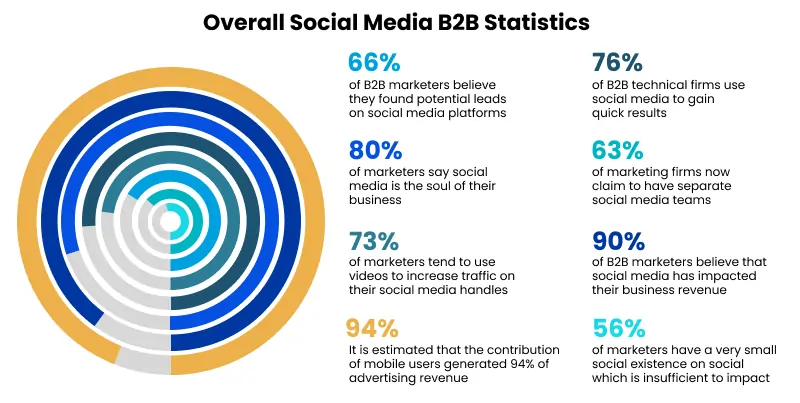
Artificial intelligence will continue revolutionizing many aspects of human lives in the coming years. One of the most visible examples of this impact is in the social media landscape. AI transforms how we interact and communicate online, from automatic content filtering and personalized recommendations to the commercials we watch.
Statista estimated there would be 4.26 billion active social media users globally by 2021, with each user spending an average of 2 hours and 27 minutes daily on social media. Along with the increase in social media users, there is an increasing demand for AI solutions to understand client preferences, with the AI market in social media estimated to reach $3,714.89 million by 2026, at a CAGR of 28.77%.

Artificial intelligence will only become increasingly valuable in social media marketing as it advances. You should expect to see even more AI solutions in the future to assist you raise your ROI and optimize you through AI in social media marketing.
Improved AI ability to auto-respond to queries, comments, and messages on your social media accounts is one such development that is expected shortly. This approach is presently focused on the employment of chatbots. However, as artificial intelligence progresses, this approach will become more incorporated into social media marketing, where auto-responses within comments and conversations can be tailored based on the user and create an almost human-like experience.
In today's digital age, social media has become an integral part of B2B marketing strategies. With the power of Artificial Intelligence (AI), businesses can leverage social media to gain insights into their target audience and create personalized marketing campaigns.
AI can help B2B marketers to optimize their social media strategies and enhance their social media presence. In this section, we will discuss some ways to leverage AI in social media for B2B marketing strategies.
But before we begin, there are some crucial social media B2B statistics that marketers should know:

Now that we know the importance of social media in the B2B domain, let's now discuss how AI in social media can help any B2B marketing strategy.
B2B social media marketing is an efficient way to reach potential consumers. However, managing many platforms simultaneously is difficult, especially when there is a lot of competition in the market to grow your business and outperform your competitor.
Marketers may use AI automation to automate many of their day-to-day processes, allowing them to focus on higher-level duties.
Hootsuite and Sprout Social are tools that allow you to manage many social media accounts from one place, schedule posts, and assess the success of your social media posts.
The process of monitoring social media platforms for mentions of your company, competitors, or relevant keywords to analyze better consumer behavior and other behavioral patterns of your target audience is known as social listening.
It's an effective technique to perform market research, gathering information on how people talk about your brand, what they think of your product or service, and their needs and desires.
For example, if you detect patterns in behavior or if individuals are discussing a certain pain point that your product or service may address, you can develop content to address that pain point.
Social listening may be a powerful tool for any organization, but it is especially beneficial for B2B businesses. This is because B2B buyers are frequently more research-oriented than B2C buyers and are more inclined to use social media to investigate potential purchases.
Social listening capabilities have recently become accessible on popular social media management tools and platforms such as Hootsuite. Still, you may also use a specialized analytics partner that you can use for your social listening.
Using social listening, you can stay ahead of the competition and ensure that your content is relevant to your target audience.
AI in social media assist in simplifying data analysis by discovering patterns and correlations that humans would find difficult to understand. It can also undertake predictive analysis, which may be used to make data-driven decisions regarding future strategy and to accurately approach your target audience.
There are also AI- analytics tools that can assist social media marketers in better understanding their sales processes that would resonate with their audience and the strategies that are most effective.
Conversational AI manages and improves your customers' social media experiences while also providing you with vital insights into your business funnels.
AI technology called "chatbots" or "pop-up messages" communicates like a human and raises brand awareness in an interesting and authentic way. By addressing basic frequently asked questions such as addressing their problems and pain points, hours of operation, contact information, service information, product information, and links to other relevant FAQs, automated conversations aid with customer care efficiency and minimize human costs. There is no wait time because the answer is virtually instantaneous, and clients may move to the transactional phases much faster, increasing conversions.
Having all of the information they need in multiple formats can save the company time and resources that would otherwise be spent manually responding to customer questions. It has also enabled social media marketers to make real-time decisions and pivot B2B marketing strategies based on customer data and target audience pain points.
Aside from chatbots, you can utilize social listening to spot possible problems early on and handle them before they escalate.
AI technology has improved dramatically in recent years, resulting in the rise of AI tools for the generation of rational and valuable content.
AI in social media enables marketers to come up with social media content quickly using content creation. Some programs can even learn to write human-like content marketing assets, however, the articulation and authenticity have not yet reached a point where it can be mistaken for a human.
AI content creation technologies can be utilized in a variety of ways to create social media content.
It is as important to educate the new sets of generations coming in as to educate the existing workforce, so they can understand how they can utilize AI in its truest sense.
AI technologies, such as BlastPoint, can be used in B2B marketing in assisting with customer relationship management and the sales process by automating processes such as lead generation and customer segmentation. AI can also be used to assist in making decisions about who to target, what offers to make, and when to make them based on customer data.
AI is one of the most current strategies used by social media marketers to enhance the value of their influencer marketing. It can examine social media profiles to determine which are the most engaging and have the greatest reach and influence in a given market.
Also, keep a watch out for AI influencer marketing, some AI have their own fan base. For example, Lil Miquela, an AI personality with over 3 million Instagram followers, has appeared in Calvin Klein and Prada advertisements. You might also create your own.
AI assists you in optimizing your social media content and managing time-consuming SEO tasks:
AI can nurture leads automatically through personalized email marketing and chatbots. By monitoring their behavior and interactions, AI can give customers automated responses or customised follow-up messages. This gives potential leads the impression that they are being heard and engaged. These nurturing programs can be configured to distribute relevant content at various phases of the buyer's journey. This facilitates the progression of prospects through the sales funnel and increases their likelihood of purchasing.
Automation is also an important component of B2B lead scoring, AI can detect when a lead has reached a specific degree of engagement by constantly watching and analyzing how customers act. In B2B lead generation efforts, this might result in automated activities, such as a personalized email or a targeted offer, bringing the efforts to close the sales.
Chatbots and AI-powered virtual assistants are becoming critical components of B2B lead generation. You can use these tools to communicate to potential leads in real-time, answer their queries, and direct them to helpful information. Businesses can maintain a consistent presence even when they are not open for business by including AI-powered chatbots in their websites and communication channels. This ensures that clients will receive prompt responses and a pleasant experience.
Chatbots can do normal and repetitive operations such as answering frequently requested questions and scheduling meetings. This frees up time for human agents to engage on more complex tasks and create connections with leads. Furthermore, chatbots can gather essential information during chats, allowing businesses to understand more about their consumers' demands and preferences and improve their lead-generation methods.

Supercharge Your Social Media Strategy with AI Today!
AI could impact your business processes, goods, and services, but how do you know if your AI initiatives and projects are achieving the promised value and return on investment (ROI)? Measuring and analyzing the impact and ROI of your AI initiatives is a difficult process, but it is critical for aligning your AI strategy with business goals, maximizing resources, and communicating your results to stakeholders. Here we will go over some of the most important procedures and strategies for evaluating the performance and outcomes of your artificial intelligence efforts and projects.
The initial step is to outline your goals for your AI efforts and projects, as well as how you will track your progress and success. You must define the precise business challenges or opportunities that AI addresses, as well as the key performance indicators (KPIs) that reflect your desired outcomes.
For example, if you're using AI to improve customer service, you might measure things like satisfaction, retention, and loyalty. When employing AI to optimize operations, metrics such as efficiency, productivity, and quality may be used. You should also establish your metrics' baseline and target values, as well as the time range for obtaining them.
The following step is to collect and analyze data to inform your metrics and showcase the impact and ROI of your AI initiatives and projects. You must ensure that you have access to data sources that are reliable, relevant, and significant enough to capture the inputs, outputs, and results of your AI solutions.
You must also employ proper data analysis methodologies and technologies to quantify and display the outcomes and trends of your AI performance. For example, you could use descriptive analytics to explain your metrics' current condition, predictive analytics to anticipate their future state or prescriptive analytics to recommend the best steps to enhance your metrics.
The third step is to compare and measure your performance in relation to your goals, metrics, and expectations. You must assess how well your AI initiatives and projects are reaching or exceeding your objectives, as well as how they compare to other alternatives or competitors. You must also examine the expenses and advantages of your AI solutions, as well as the ROI, which is calculated as the ratio of net benefits to total costs. You may, for instance can compare the ROI of your AI solutions to no-AI solutions, or to that of a similar AI solution in that industry or domain.
The fourth step is to discuss and disclose your findings and insights to your stakeholders, who could include management, team members, customers, or investors. You must deliver your findings in a clear, concise, and engaging manner that illustrates the worth and impact of your AI programs and projects.
You should also adjust your message and structure to your audience, and utilize visual aids to illustrate your data and metrics, such as charts, graphs, or dashboards. For example, you could use a story or a case study to demonstrate the benefits of your AI solution for a specific customer or scenario, or you could use a scorecard or a dashboard to show the status and development of your AI KPIs and objectives.
The final step is to use your results and input to improve your AI initiatives and projects. You must recognize your AI solutions' strengths and shortcomings, as well as possibilities and challenges for progress. You must also test and evaluate your assumptions and hypotheses before adjusting your objectives, measurements, and strategies. Experiments or A/B testing, for example, might be used to evaluate different AI models or features, or surveys or interviews could be used to gather input from your customers or users.
AI has its own share of risks. One important source of concern is AI bias, which occurs when systemically biased decisions are made as a result of assumptions generated during the machine learning process. AI bias is caused by a lack of quality, objectivity, and a large enough number of training data. Similarly, biased humans may unintentionally generate biased algorithms.
Another issue is the promotion of echo chambers, in which thousands of people with the same perspective continue to share and support a single idea or conviction. Social media platforms may expose users to questionable content, such as posts that disseminate misinformation, by promoting content that users indicate interest in. This can reinforce consumers' preconceived notions.
Some AI programs may also collect data on users, which some people may find intrusive. Social networking networks, for example, may collect data on a user's age, name, location, online behavior, and photo metatags in order to provide a better targeted advertising experience.
Because of the volume of content on sites such as TikTok and YouTube, AI algorithms are frequently used to moderate content. However, this can result in erroneous takedowns and harmful content slipping through the cracks. For example, YouTube's use of AI content filtering once resulted in many wrongful video takedowns, which creators later challenged.
Concerns have also been raised concerning the spread of deepfakes on social media for malevolent social and political purposes.
1. What is AI marketing?
Artificial intelligence marketing (also known as AI marketing) is the practice of applying AI to target customers, analyze data, and personalize ad campaigns. It entails employing AI technologies and strategies to streamline the process and achieve marketing objectives.
2. How can AI be used in B2B marketing?
AI B2B marketing is the application of artificial intelligence in business-to-business marketing to automate numerous jobs and improve marketing processes. AI can be utilized for lead generation, content creation, sales forecasting, and other purposes. Overall, it promotes informed decision-making.
3. What are the potential challenges or limitations of using AI technology?
Though AI technology has amazing advantages, there are two major concerns: privacy and data security. Organizations must exercise extreme caution while implementing AI technology. They must adhere to the applicable data protection rules and regulations. They must also guarantee that adequate data security safeguards are in place.
Now is the time to use AI in your B2B marketing. It can assist increase your business revenue and reduce expenses, but it will not remove your job—it will simply offer up new opportunities and make you more effective at implementing your social media marketing strategy.
Of course, there are risks associated with AI. Perform your due diligence. Read more on artificial intelligence in business social media, and you can also speak with a social media expert to help you make the best decisions, identify the ideal platforms, and manage them.
Interested in our Social Media Services?

Z
Thank you for sharing these valuable tips on social media strategy.
M
This blog post is a goldmine of social media wisdom! Your insights on creating a well-rounded social media strategy are incredibly valuable.
N
Your post highlights the significance of engagement and community building on social media. Building genuine relationships with your audience is crucial, and your tips on fostering connections are spot on.
B
The emphasis on a data-driven approach in your blog is refreshing. It’s clear that your strategies are not just based on trends but also on solid data analysis, making them more reliable and effective.